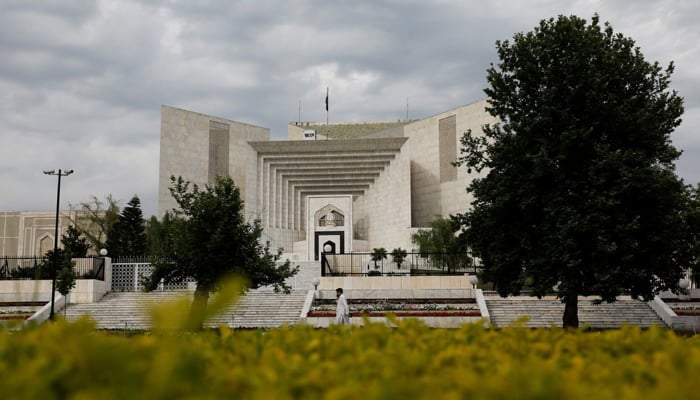Peshawar, 25 March, 2024 (GNP): The government of Khyber Pakhtunkhwa made a request to the Supreme Court on Monday to retract the appeal filed by the previous provincial caretaker government regarding the court’s ruling on October 23, which deemed military trials of civilians invalid.
The current provincial cabinet, headed by KP Chief Minister Ali Amin Gandapur, presented a resolution supporting the withdrawal of the intra-court appeal. Despite the request, the Supreme Court clarified that appeals related to cabinet resolutions cannot be simply returned, instructing the KP government’s counsel to formally apply for the withdrawal of the appeal.
In November of last year, the caretaker government of Khyber Pakhtunkhwa, along with the federal government and other provincial administrations, lodged intra-court appeals against the Supreme Court’s October 23 ruling, issued by a five-member bench.
The apex court’s decision nullified civilian trials in military courts stemming from the May 9 riots, which were incited by the arrest of Pakistan Tehreek-e-Insaf (PTI) founder Imran Khan on corruption charges.
Furthermore, the court ruled that 103 individuals and others connected to the events of May 9 and 10 should be subject to trial in criminal courts established under ordinary or special laws of the country.
The Pakistan Tehreek-e-Insaf (PTI) and other parties approached the Supreme Court, arguing against the lack of transparency in military trials.
Read more President Asif Ali Zardari to enhance trade and investment ties with USA
The Khyber Pakhtunkhwa government expressed its intention to withdraw the appeal during a hearing presided over by a six-member bench led by Justice Aminuddin Khan.
At the beginning of the session, the lawyer representing former Chief Justice (retired) Jawad S Khawaja, one of the petitioners, raised an objection to the composition of the bench. He argued that the bench size should have been larger.
The lawyer consequently requested the establishment of a nine-member bench, emphasizing that the decision in this case should not be clouded by uncertainty regarding the bench’s composition. He raised concerns about how the verdict might differ if a nine-member bench were to handle the proceedings.
The counsel said, “It is a matter of public trust in this institution. The court should ask the committee to constitute a nine-member bench”.
Expressing his perspective on the bench’s formation, Khawaja Ahmed Hussain, the lawyer representing one of the petitioners, reiterated his earlier request for a nine-member bench. He suggested that it would be suitable to refer the matter back to the judges committee for further consideration.
Justice Muhammad Ali Mazhar remarked upon his request, “If a 9-member bench had been formed earlier, it would not have been possible to hear the appeals today”.
The attorney said, The five-member bench of the Supreme Court declared the trial null and void by giving a unanimous decision”.
He further pointed out that if a two to four-member bench were to declare the ongoing hearing’s verdict null and void, it would likely spark controversy.
He said, “For public trust in the judiciary, it is important that the decision is not controversial”.

